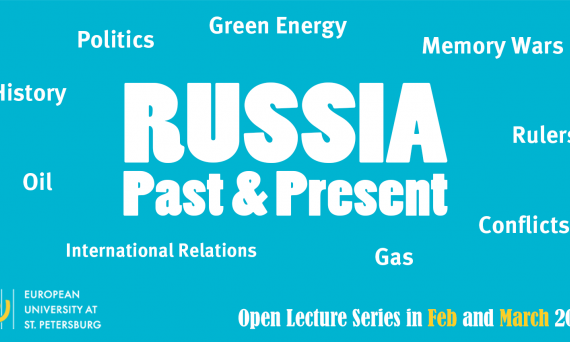We invite international students, young professionals, and expats in St. Petersburg to take part in our new series of open lectures in English on Russia's Past and Present.
For six consequent Wednesdays at 18:30 in February and March 2020, EUSP professors and researchers will deliver lectures on Russian history, foreign policy, energy politics, and global affairs. Working language - English
February 19, 2020
Use of History in Russian Politics by prof. Ivan Kurilla (in English)
Venue: Freedom Space (7, Kazanskaya street)
The politicization of history and the use of the past in contemporary debates is nothing new. In recent decades, however, this process has grown particularly intense. Russia is perhaps one of the most acute cases of the battle over memory and memory culture. The first period of the past that the Russian state decided to control was World War II. Recently, people and organizations dealing with the memory of political repressions and working with the traumatic memory of Russia’s mid-20th century have become targets of state pressure, simultaneously with the new round of international “Memory Wars” between Russia and the West, especially, Poland. Those two trends are interconnected, as Professor Ivan Kurilla will demonstrate in his lecture on February 19.
Please register to join the lecture
February 26, 2020
Recent Changes in Energy Markets: Impacts on Russia by prof. Irina Mironova (in English)
Venue: Freedom Space (7, Kazanskaya street)
Russia is one of the leading exporters of energy resources and natural gas in particular. Key developments in energy markets influence Russia’s standing in target markets, and its policies. In this lecture, Irina Mironova aims to review several large trends in energy and, more narrowly, natural gas markets, and their impact on Russia’s energy policy. The following developments of the global energy picture will be discussed:
- Climate policies on the rise in various parts of the world;
- The rise in global liquefied natural gas (LNG) supply;
- The growing importance of natural gas price indices (“commoditization” of the market) and historically low level of natural gas prices.
Please register to join the lecture
March 04, 2020
Economic Tools of Russian Foreign Policy by prof. Nikita Lomagin (in English)
Venue: Freedom Space (7, Kazanskaya street)
Paradox of Russian power seems to be in substantial gap between what is traditionally viewed as economic power and Kremlin’s foreign policy results. Indeed, as World Economic Forum data shows, the Russian Federation's economic power is rather modest. But despite declines in commodity prices, the effects of economic sanctions imposed by the US and other nations, a high rate of capital flight and brain drain Russia, and for all of Russia’s domestic problems– it has projected a surprise amount of power not only in its neighbourhood but also beyond.
Please register to join the lecture
March 11, 2020
Energy sector in Russia: new dimensions in sustainability-related disclosures by prof. Olga Teplova (in English)
Venue: Freedom Space (7, Kazanskaya street)
This lecture on extra-financial investment analysis of energy sector companies is an attempt to navigate through the mushrooming disclosure standards and clarify the defining features of sustainable strategies used by international energy companies in general and Russian energy companies in particular.
Although the concept of extra-financial analysis has been on the rise in the last decade, much has to be done in order to make this concept economically viable and legally defined for the energy sector. Lack of sustainability-related data that would comply with the principles of comparability and materiality represents the main stumbling block for the scale-up. At the moment, several industry-driven initiatives that are aimed at better disclosure of ESG (environmental, social and governance) risks and their impact on financial performance are gaining weight among investors and policymakers.
Please register to join the lecture
March 18, 2020
Russia and Iran in the Current World Order by prof. Gevorg Avetikyan (in English)
Venue: Freedom Space (7, Kazanskaya street)
Russian-Iranian relations have significantly improved and progressed in the past several years. The two countries have identified a number of matters of common interest in Eurasian and Middle Eastern regional developments. Where possible, Moscow and Tehran have attempted to avoid confrontation. The relations between Iran and Russia are sometimes described as a strategic partnership or even alliance. This lecture will present the current state and try to evaluate the prospects of Russian-Iranian affairs within the regional and global context.
Please register to join the lecture
March 25, 2020
St. Petersburg and Moscow: two different Russias? by prof. Sergei Podbolotov (in English)
Venue: European University at St. Petersburg (1, Spalernaya street)
The foundation of St. Petersburg in times of Peter the Great signified the emergence of new Russia, the country following the path of “the West”. Old Moscow remained the center and the symbol of Russia traditional and true. In Russia imperial, the admirers of the West used to find their inspiration in St. Petersburg while Moscow attracted those looking for national foundations and roots. How these two worldviews were developing and competing? How the existence of two centers affected the fate of the country? What happened in the Soviet period when Moscow regained the status of the capital? These fundamental “Russian questions” will be discussed in this talk.
Please register to join the lecture
Each lecture will be followed by a short discussion. There will also be some time for networking. Free snacks and tea/coffee will be offered at the lecture venue.
Please register for each lecture you plan to attend. By attending at least 3 lectures, you will receive a special Certificate of participation in the "Russia: Past and Present" series of open lectures organized by EUSP.

